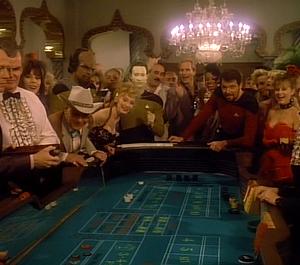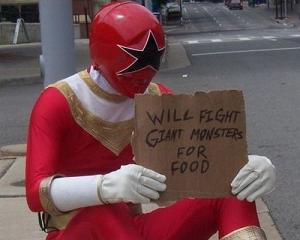The Truth about Publishing Your Novel (From the Perspective of the Unpublished) - Page 2
The Odds Hate You, Your Family, Your Friends, and Your Casual Acquaintences
 | | It's like trying to beat Data in Vegas |
There are, as best as I can discern, two major things you need to get published that are many times more important than skill. The first of these is luck. In order to appreciate how important luck is, you have to look at the odds. I'm going to engage in some extremely amateur statistics here, but I disclaim that these numbers are far from scientific and my math isn't very sophisticated. In the interests of full disclosure, "Statistics and Probability" was the only college course I actually failed.
What most people don't fully appreciate is that there is an ocean of aspiring writers in the world. Everybody knows at least one person who is writing a book, and if you stop to consider how many aspiring writers there must be compared with how many people actually get published every year, you might start to get a sense of the problem. It's like the statistic about how there are more people in law school than there are lawyers practicing law, only with writing, it's much, much worse.
Let me take you through the early stages of the process in order to illustrate. Once you have written something and are relatively happy with it, you need to get an agent. This is absolutely critical nowadays, because the people at the publishing companies who decide what gets published--the "editors"--don't have time anymore to deal with writers (or, ironically enough, to edit). An agent is somebody who can navigate the impossibly complex waters of the industry, have business lunches with publishers, and do the actual legwork of selling your book. If you're endowed with a little extra luck, you can get an agent who will do even more; a good agent will help you get your manuscript professionally edited, will point you in the direction of a good publicist, and will hold your hand through the entire process.
Alas, getting an agent isn't as easy as making a phone call and hiring somebody for a flat rate. In another maddening twist of irony, you have to pitch your work to the people you hire to pitch your work. They'll only take you on if they're impressed, believe your work can sell, and just happen to have enough space for you in their client list. Pitching your work can be done in multiple ways, but the easiest, simplest, and most common method is through the use of query letters. A query letter is a simple, one-page letter that boils down to, "Please, for the love of God, will you help me get published?"
 | | Kinda like this |
I'm not going to go into detail about the query itself (there are plenty of books out there that can help you write the best possible query letter), but for the sake of simplicity, I'm going to assume that all queries are relatively the same. I know this assumption is false, but let's rhetorically ignore the fact that most query letters are extremely bad. There are hundreds of agencies out there--hundreds--and they each have their own specialties. For any given book, be it fiction, non-fiction, poetry, horror, women's fiction, whatever, there's probably an average of around 50 agencies that will be willing to consider it. That means that you have, essentially, 50 chances to pitch your work. (You can query the same agency multiple times, but you get the point.)
Now consider that the average agency receives about 50 queries every single day (roughly 18,250 a year), even on the weekends, and will only sign on around 5 new clients a year. Big agencies can top 200 queries a day and 20 new clients every year. Assuming that every query has an equal shot and that each one is unique, that means you have roughly a .027% chance with every query. (For the sake of comparison, you have a .033% chance of getting struck by lightning in your lifetime.) If you assume that you have 50 chances and that it's all a crap shoot (which it kinda is), that means you have no more than a 1.4% chance of getting an agent with any given book, which doesn't even get into your odds of actually getting published or subsequently being successful enough to get the chance to publish a second book.
Really, if you spend enough time just looking at the statistics, you'll come to realize that you have a better chance of winning a million dollars in the lottery than in becoming a successful writer on odds alone. That's not hyperbole, either; it's a fact. I'm not even getting into the minutiae about how literary trends can make your book stand out one minute but look like garbage the next or how your chances of getting an agent's attention are dictated more by whether the guy reading your query got drunk last night or has an irrational hatred of all letters that use double spacing between sentences than by the query's actual content. When you add up all the variables, you're left with an existentialist's sense of insignificance that would give Friedrich Nietzsche nightmares.
Those with Connections get Priority Boarding
 | | Alas, friending a literary agency doesn't count |
I said there were two things you needed much more than skill, the first of which was luck. The second thing you need is connections. In yet another infuriating twist of irony, the writer--the most solitary of professionals--needs to schmooze, socialize, and make friends with business types in order to succeed. Agents are far more likely to take somebody on through recommendations or personal interactions than they are on the basis of an impersonal query letter. This is why every aspiring writer, regardless of social awkwardness, needs to go out and meet people in order to get published.
You can join writers associations and editing circles to get to know other writers, in the blind hope that one of them will be both successful and impressed enough with you to remember you during their book signing tours. Unfortunately, every writers group I've ever been a part of has devolved into a group of people commiserating each other about how much it sucks trying to get published. The chances that anybody in any of these circles remembers me is also pretty slim, given that I have a hard time being social with people I barely know.
Another option is attending writer's conferences, which many will tell you is crucial to success as a writer. Indeed, writer's conferences are hugely beneficial for any writer able to set aside his or her ego for a while. Most of everything I know about the industry I learned at writer's conferences, and the furthest I ever got down the gauntlet--having an agent request my entire manuscript--started with a 5-minute pitch at a writer's conference, one of the most nerve-racking experiences of my life (due in large part to having only five minutes to pitch my work face-to-face to an extremely well-respected agent who said exactly nothing until the end).
Still, if you're socially awkward--and chances are, if you're a novelist, you probably are--you're still not likely to walk away with a contact to place in your Rolodex, if you even have one. (I don't.) This is where agents were originally designed to step in, but now the industry has grown and struggled so much with a dwindling interest in literature on the part of society at large that it probably wouldn't be a bad model to start a business geared towards finding agents for writers, thus adding another layer to the insanity.
There's a Good Chance You Will Be Squashed... Permanently
 | | Even the most delicious pastries can get flattened when they try to cross the road |
Let's say you've gone through each of the major and incredibly difficult steps along the way to finding a publisher. You wrote your book, you edited it, you convinced an agent to take you on, and that agent miraculously found a publisher interested in publishing your book. If you think this is the end of the line, you are sorely mistaken and probably doomed to fail at making a career for yourself. Worse yet, once you fail due to your unfortunate ignorance, you will never, ever get a second chance.
What the publisher won't tell you--and your agent might not tell you--is that the hard work really picks up in earnest when your book is on its way to publication. You absolutely have to publicize yourself, which will be difficult if you have no money. If you don't publicize yourself, your book will not sell, and if your book does not sell, no publisher will ever be interested in another one from you; it's as simple as that. Again, you have to look at it from the publisher's point of view to understand why. You have proven that your work does not sell on its own merits, and worse yet, you've proven that you do not have the initiative to see to it that your work sells. Therefore, you are worthless as a business asset, and you might as well stop trying to get published from that point on.
What's much, much worse is that, even if you do all the legwork required and hire the best publicist in the business, there is no guarantee your work will sell. There is nothing more fickle and unpredictable than people at large, and nobody can foresee which books will launch enormous careers and which ones will collect dust on store shelves. If your first book flops, even if it's critically acclaimed, your career is just as forever doomed as it would have been had you done nothing.
This is terrifying for an aspiring writer, but it's absolutely essential that you face it and know it. The fact of the matter is that the situation can be exceedingly cruel to you if you don't know what you're doing. The second you get an agent on your side, you need to start looking for a publicist and you need to get your hands on enough money to afford it. If you're not busy trying to build up your persona or figure out how to sell yourself while the agent is trying to sell your book, you might as well give up at ever having a career through writing.
Only Bigots Think It's a Lifestyle Choice
Of course, even if you do manage to sell yourself and make a career of it, the odds that you'll make more money through your writing than you would flipping burgers at McDonald's are slim to none. Therefore, if you got into writing for the fame and fortune, you are a sad, sad creature indeed. If you're one of the truly blessed and manage to make it to the end of the gauntlet--in the middle of all the writing, editing, conferencing, chatting with your publicist, schmoozing with your agent's secretary, reading industry magazines, and being interviewed by The New York Times--you better have a day job that actually pays you something.
-e. magill 3/8/2011
|
|